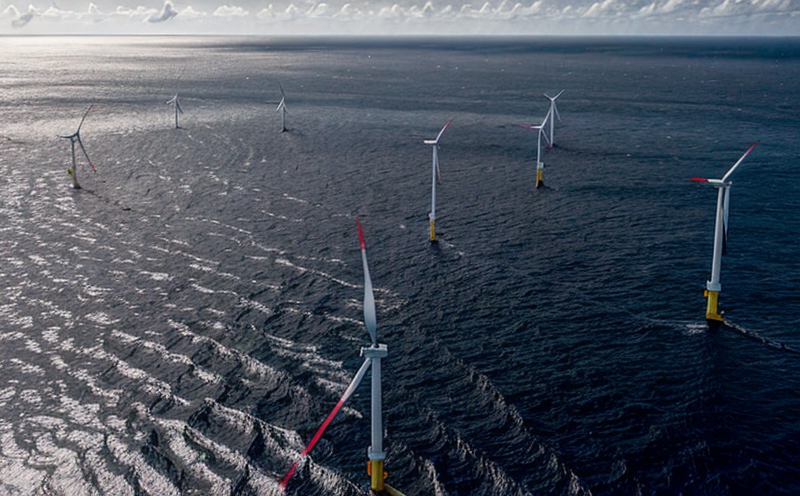DNVGL-ST-0376 Blade and Rotor Reliability Testing at Wind Farms
The DNV GL standard DNVGL-ST-0376 is a widely recognized benchmark for ensuring the reliability of wind turbine blades and rotors. This standard plays a crucial role in the energy sector by providing comprehensive guidelines to evaluate the structural integrity, fatigue resistance, and durability of wind turbine components under real-world operating conditions.
The testing process outlined in DNVGL-ST-0376 is designed to simulate the harsh environments that offshore and onshore wind farms face. This includes exposure to extreme weather conditions such as high winds, salt spray, and temperature variations. The standard also considers the dynamic loading experienced by turbine blades during operation, which can lead to fatigue cracks or other structural damage over time.
The testing involves several stages, including initial inspection of the blade or rotor, followed by non-destructive testing (NDT) techniques such as ultrasonic testing and magnetic particle inspection. These methods help identify any potential flaws that could compromise the safety and performance of the turbine components. Once identified, the defects are quantified using advanced instrumentation to ensure accurate assessment.
The next step in the process is fatigue testing, which simulates the cyclic loading experienced by wind turbines during their operational life. This stage often requires specialized equipment capable of subjecting specimens to high-frequency oscillations and varying loads. The results from this phase are critical for assessing the long-term reliability and expected lifespan of turbine blades and rotors.
In addition to fatigue testing, DNVGL-ST-0376 also mandates testing under static loading conditions to evaluate the structural strength and stability of the components. This ensures that even in extreme scenarios where dynamic loads are absent, the turbine remains safe and operational.
The standard emphasizes the importance of maintaining accurate records throughout all stages of testing. These records serve as crucial documentation for compliance with regulatory requirements and provide valuable insights into the performance characteristics of the tested specimens. Compliance officers can use this information to make informed decisions regarding maintenance schedules and potential replacements, thereby optimizing operational efficiency and minimizing downtime.
Quality managers and R&D engineers benefit significantly from adhering to DNVGL-ST-0376 as it ensures that all testing is conducted according to international best practices. This not only enhances product quality but also contributes to the overall safety of wind farms by identifying any latent defects early in the production cycle.
For procurement teams, compliance with this standard adds credibility and ensures that they are sourcing high-quality materials and components from reliable suppliers who adhere to stringent testing protocols.
Benefits
Ensures adherence to international standards for blade and rotor reliability testing.
Provides robust data supporting the structural integrity and durability of turbine components.
Enhances safety by identifying potential defects before they lead to catastrophic failure.
Simplifies compliance with regulatory requirements, reducing the risk of non-compliance penalties.
Supports continuous improvement in product design through detailed testing outcomes.
Builds trust among stakeholders by demonstrating a commitment to high-quality standards.
Reduces operational costs associated with premature failures and unscheduled maintenance.
Eurolab Advantages
EuroLab offers unparalleled expertise in the field of wind turbine testing, boasting a team of highly qualified professionals who are well-versed in DNVGL-ST-0376. Our state-of-the-art facilities provide an ideal environment for conducting comprehensive tests that meet the highest standards.
We employ cutting-edge technology and advanced instrumentation to ensure precise measurements and reliable results. This allows us to offer accurate assessments of blade and rotor reliability, providing clients with actionable insights into their equipment's performance.
Our commitment to quality is reflected in our ISO 9001:2015 certification, which ensures that every aspect of the testing process adheres to strict quality control measures. This includes rigorous training programs for all personnel involved in conducting tests and maintaining meticulous documentation throughout the entire process.
In addition to our technical capabilities, EuroLab also offers comprehensive support services to help clients navigate the complexities of regulatory compliance and product certification. Our experienced consultants can assist with interpreting test results, developing maintenance plans, and ensuring that all projects comply with relevant standards.
Competitive Advantage and Market Impact
EuroLab's proficiency in DNVGL-ST-0376 testing gives us a distinct competitive edge by providing accurate and reliable test results.
Our ability to offer comprehensive support services enhances client satisfaction, fostering long-term partnerships.
The high level of expertise within our team allows EuroLab to stay ahead of industry trends, ensuring that we are always at the forefront of technological advancements.
EuroLab's commitment to quality and compliance positions us favorably in the market, attracting clients who value reliability and precision.
By adhering strictly to DNVGL-ST-0376 standards, EuroLab ensures that its services contribute positively to the energy sector. This standardization not only enhances product quality but also promotes a safer environment for wind farm operations, ultimately driving market growth through increased trust and confidence in renewable energy solutions.





